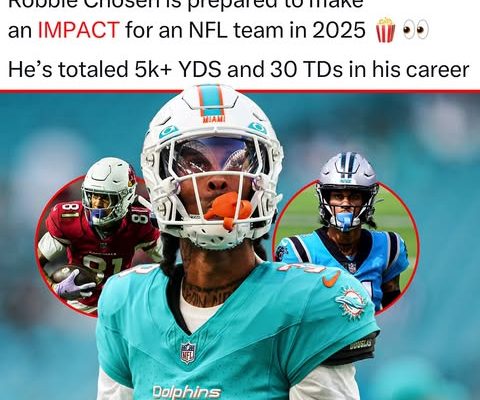Robbie Chosen Anderson is preparing to enter his 10th NFL season, and for a player who has built a career on resilience, speed, and staying ready for whatever challenge comes next, this milestone represents far more than just a number. It is the product of persistence, personal evolution, and a refusal to allow any chapter of his career to be written by doubt. Though he may not be the same breakout speedster that once torched defenses for over 1,000 yards in a single season, Anderson is still training with purpose, maintaining a mindset rooted in preparedness, and hoping for the right opportunity to prove he still belongs among the best athletes in the world.
Anderson’s career has never been one of conventional success. After going undrafted in 2016 despite a strong senior season at Temple University, he caught on with the New York Jets during training camp. His journey was not guaranteed, and in a league where only a handful of undrafted players carve out long-term careers, the odds were stacked against him. But Anderson had one thing that separated him from the rest: elite speed. He showcased that speed early and often, turning heads during preseason and eventually earning a spot on the roster. From there, he became a bright spot on an often-struggling Jets offense, building chemistry with quarterbacks and putting up numbers that made other teams around the league take notice.
His breakout year came in 2017, when he recorded 941 receiving yards and seven touchdowns, proving to be a legitimate deep threat. His ability to stretch the field was reminiscent of classic vertical receivers—thin build, long stride, deceptive acceleration—but it was more than just the go routes that made him dangerous. Anderson refined his route running, worked on separation through breaks, and became more than just a one-dimensional weapon. In 2020, now with the Carolina Panthers, he posted his first 1,000-yard season, catching 95 passes for 1,096 yards. It was a year that reminded everyone that Anderson wasn’t just fast—he was also a reliable target with strong hands and the ability to navigate defenses with savvy and precision.
But like so many careers in the NFL, Anderson’s trajectory has not been linear. His production dipped in subsequent seasons, and in 2022, he found himself traded mid-season from Carolina to the Arizona Cardinals after an in-game sideline incident with then-head coach Steve Wilks. That moment became a flashpoint in Anderson’s career, drawing scrutiny and casting doubt on his maturity and future in the league. But for Anderson, who had already been labeled early in his career for his outspoken nature, this wasn’t the first time he’d had to navigate perceptions. He accepted the challenge quietly, continued to work, and made clear that he was still focused on football.
In 2023, Anderson signed with the Miami Dolphins and officially changed his name to Robbie Chosen, a decision he explained as part of a personal transformation. It wasn’t just about branding or standing out; it was about identity. For a man who had grown both on and off the field, the name “Chosen” carried spiritual and motivational significance. It reflected a belief in destiny, perseverance, and self-worth—core tenets of how he’s navigated the turbulent waters of the NFL.
Now entering what could be a critical juncture in his career, Anderson remains unsigned but optimistic. He has not announced retirement, nor does he intend to fade quietly into the background. Instead, he’s doing what he’s always done: staying ready. Videos have surfaced of him training rigorously—cutting hard on routes, showing off the same top-end speed that once made safeties panic, and keeping his body in top condition. For Anderson, readiness is not a vague mindset; it’s a full-time commitment. He knows the phone call could come at any moment, and when it does, he wants to be in the best shape possible to seize the opportunity.
What makes Anderson’s story even more compelling is the way he’s embraced humility and growth over time. He’s no longer chasing highlight-reel plays or Pro Bowl accolades. He’s not looking to be a WR1 or dominate targets in a pass-heavy offense. He’s positioning himself as a veteran presence, someone who can contribute in a rotational role, provide depth, and bring wisdom to a locker room. His experiences, both triumphant and turbulent, have made him an invaluable mentor for younger players. In a league where young receivers are learning to handle the spotlight and pressure, a veteran like Anderson—who’s seen the highest of highs and the lowest of lows—can offer real, grounded guidance.
One of the most undervalued aspects of Anderson’s readiness is his durability. Over the course of his career, he’s rarely missed games due to injury. In a league where soft-tissue injuries and collisions take a toll on receivers’ bodies, that kind of availability is gold. For teams looking to fill out a depth chart late in camp or mid-season due to injuries, a player like Anderson, who keeps himself in peak condition, becomes a low-risk, high-reward option.
It’s also impossible to ignore how well Anderson fits in the modern NFL. As offenses continue to emphasize speed, spacing, and explosive plays, Anderson’s toolkit remains relevant. He may not run a sub-4.3 40-yard dash anymore, but his straight-line speed and ability to threaten safeties still matter. He forces defenses to respect the deep route, opening space for underneath options. And with offensive coordinators now obsessed with motion and pre-snap shifts, a veteran like Anderson can easily plug into schemes designed to isolate mismatches and create chaos.
It’s clear that Anderson is not delusional about where he stands in the NFL hierarchy. He understands that he’s no longer the young standout with a chip on his shoulder, fighting to prove he belongs. He’s now the seasoned pro, the battle-tested journeyman who brings value in more subtle, but equally important, ways. And he’s fine with that. His maturity shows in the way he communicates now—calmer, more measured, more focused on accountability and purpose.
Off the field, Anderson has also grown in how he uses his platform. He’s taken part in youth football events, spoken candidly about mental health, and continued to express his faith. His name change to Chosen wasn’t just symbolic—it was deeply rooted in his belief that every challenge he’s faced has prepared him for a purpose greater than just stats and game checks. That kind of mindset, combined with his work ethic, keeps him moving forward even when the spotlight dims.
In a league where younger, faster, and cheaper are often favored, veterans like Anderson have to carve out a niche to stay relevant. That niche might not earn headlines, but it’s often the glue that holds rosters together. Teams with playoff aspirations know the value of depth and veteran savvy. And when injuries hit, as they inevitably do, the difference between a lost season and a resilient bounce-back can come down to having the right people in the room. Anderson wants to be one of those people.
As preseason ramps up and rosters begin to take shape, Anderson’s name will continue to surface. He’s not demanding attention, but he’s ready for it. He knows that opportunity is often about timing. All it takes is one team, one injury, one opening—and a player like Anderson, who has already beaten the odds more than once, will be ready. In many ways, this moment, this waiting game, defines the essence of his career. The league may not always make room for players like him, but he’s never waited for permission to succeed. He’s trained, prepared, and evolved.



